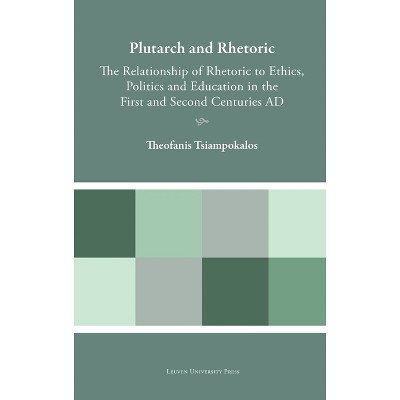An Opaque Mirror for Trajan - (Plutarchea Hypomnemata) by Laurens Van Der Wiel (Hardcover)

About this item
Highlights
- Plutarch's Regum et imperatorum apophthegmata (Sayings of Kings and Commanders) holds a peculiar position in his oeuvre.
- About the Author: Laurens van der Wiel is a postdoctoral researcher at the University of Warsaw.
- 500 Pages
- Literary Criticism, Ancient & Classical
- Series Name: Plutarchea Hypomnemata
Description
Book Synopsis
Plutarch's Regum et imperatorum apophthegmata (Sayings of Kings and Commanders) holds a peculiar position in his oeuvre. This collection of almost 500 anecdotes of barbarian, Greek, and Roman rulers and generals is introduced by a dedicatory letter to Trajan as a summary of the author's well known and widely read Parallel Lives. The work is therefore Plutarch's only text that explicitly addresses a Roman emperor and is likely to shed light on his biographical technique. Yet the collection has been understudied, because its authenticity has been generally rejected since the nineteenth century. This book restores its reputation and provides a first full literary analysis of the letter and collection as a genuine work of Plutarch, wherein he attempts to educate his ruler by means of great role models of the past. Plutarch's thinking about the function of role models (exempla) is not only relevant for Plutarchan research, but also for our knowledge of exemplarity, a key feature both in Greek and Latin literature in the early imperial period in general. Therefore An Opaque Mirror for Trajan is also of interest for literary and historical scholars who study the broader context of ancient literature of the first centuries CE.
Free ebook available at OAPEN Library, JSTOR, Project Muse, and Open Research Library
Review Quotes
Van der Wiel provides an immensely valuable study of the Reg. et Imp. Apoph. While it presumes a familiarity with the collection, clear programmatic introductions to each part and many of the subsections as well as regular summarising conclusions make the volume approachable and accessible even for those unfamiliar with the text. The breadth of parallel and comparative material from the Plutarchan corpus-especially the Lives-ensures the book will be informative and engaging for senior students and scholars interested in Plutarch's conceptualisation of moral education. Ultimately, van der Wiel offers a guide for how we can, and perhaps ought, to read Plutarch-in the Reg. et Imp. Apoph. itself, to be sure, but also in the broader Plutarchan corpus. - Colin Bailey, Histos 19 (May): i-vi. https: //doi.org/10.29173/histos707
Superbly thorough and in many ways groundbreaking reading of an understudied work by Plutarch. The ethical programme and historical scope of 'Sayings of Kings and Commanders' are vigorously reappraised.
Alexei V Zadorojnyi, University of Liverpool
Van der Wiel's thoughtful, detailed, and meticulous study breaks new ground, and greatly enhances our understanding of the relationship between Plutarch's dedication letter to Trajan and the 'Regum et imperatorum apophthegmata' collection. He forcefully and persuasively argues for the authenticity of both the letter and the collection. This is unquestionably the most important interpretation of this somewhat neglected aspect of Plutarch's oeuvre yet published.
Mark A. Beck, University of South Carolina
About the Author
Laurens van der Wiel is a postdoctoral researcher at the University of Warsaw. He is part of the project "Thinking of Thinking. Conceptual Metaphors of Cognition in the Plutarchan Corpus".
Shipping details
Return details
Trending Fiction











